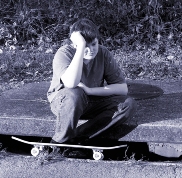Not Just Alcohol and Pot: What Teens Are Using to Get High
 Parents are trained to keep their eye out for alcohol and marijuana when they are concerned that their child is abusing drugs during their teen years. And while these are the two most common drugs of abuse among American teens between the ages of 12 and 18, they are far from the only substances abused in this age group.
Parents are trained to keep their eye out for alcohol and marijuana when they are concerned that their child is abusing drugs during their teen years. And while these are the two most common drugs of abuse among American teens between the ages of 12 and 18, they are far from the only substances abused in this age group.
Plus, kids are creative. Many find things around the house to abuse in attempt to get high: leftover painkillers in the medicine cabinet, over the counter cough medication, aerosol products, glue, nail polish remover and more. It makes the job of the parent that much harder – not only trying to guess what the next trendy drug of abuse will be but to keep it out of reach and hidden away.
Not Harmless: The Abuse of Household Goods by Kids and Teens
Elementary-aged and middle school-aged children have reported inhaling or ‘huffing’ household solvents and supplies in an attempt to get high. Many view it as harmless, even a game, and few realize how deadly it is to play with these substances. The resulting dizziness and loss of coordination are funny to them and their friends, and they repeat the behavior to get a laugh more than to get high.
Older kids often try over the counter medications and leftover painkillers in the medicine cabinet because parents may not monitor them as closely as the alcohol cabinet. They may be looking to get high, but feel that these medications are not harmful because they are recommended by or prescribed by doctors.
Unfortunately, any abuse of chemicals no matter how or why they came into the possession of the child can cause brain damage, overdose, seizures or even death. They are most certainly not harmless.
Unknown Substance Abuse Among Teens
Then there is the long list of substances abused by teens that parents have never even heard of: a synthetic marijuana called Mr. Nice Guy, for example, or a powdery substance called bath salts, or plants like salvia, famously smoked by Miley Cyrus. How can parents even know what to look out for?
Educate yourself. Parents are encouraged to research online, pay attention to their kids’ texts and phone conversations and to talk to their kids regularly about drug abuse and what to avoid. Research shows that kids do listen when their parents warn them off about drugs and alcohol – no matter how rare or seemingly harmless they are.
